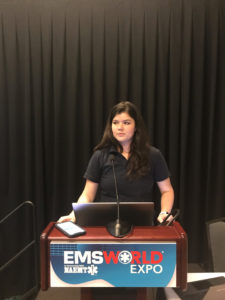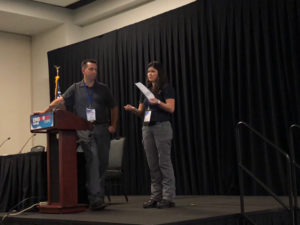November 3, 2018

Paramedic Anne Jensen presents to EMS World Expo attendees on the “Systems of Care” in community paramedicine.
EMS World Expo; Nashville, TN— This week California paramedics Anne Jensen and Shawn Percival hosted two events centered on the continuing evolution and advancement of community paramedicine (CP) programs. Joining national leaders in the community paramedic space, they led vibrant discussions on navigating systems of care in at-risk populations and moderated discussion on approaches for overcoming difficult, recurring patient profiles.
The first discussion on Wednesday, a joint presentation between Anne Jensen and Dr. Dan Swayze of the Center for Emergency Medicine of Western Pennsylvania, focused on unique systems of care that must be navigated in at-risk populations. Community paramedics intervene with patients at the frontend of healthcare where they must make critical choices to efficiently and successfully guide these patients to appropriate, non-emergent treatment. Jensen and Swayze focused on three new systems that they have found to be important subcomponents to the whole— drug and alcohol recovery, food security, and income subsidy.
“Systems of care,” a phrase coined by Jensen and Swayze, is an effective format to discuss the core offerings of community paramedic programs. In a traditional sense, paramedics are trained to understand systems of care in medical and trauma patients. Interventional cardiac services, neurological services, trauma services, or psychiatric services— each represents a distinct system of care in which paramedics are familiarized. They are familiarized so that their patients receive appropriate, effective care from the beginning of their interaction together. In the complex healthcare landscape, these systems of care are interwoven across multiple providers and facilities, where each facility or network cannot control the whole, and thus paramedics become a glue for their strategy of care.

Paramedics Anne Jensen and Shawn Percival lead an open discussion with attendees on common features of at-risk patients and strategic approaches.
Community paramedicine builds on this foundational approach by broadening the systems of care available for paramedic consideration in patient triage and care. Jensen and Swayze have identified additional systems of care as substance abuse, food security, and income are common areas of intervention in frequent 911 users. The systems-based approach acted as an elegant framework for their discussion, and the value was broadly enjoyed.
On Thursday of the expo, Anne Jensen joined fellow San Diegan Shawn Percival for an open discussion on the management of difficult and recurring patient profiles. The pair started the conversation with examples of common examples on which their guidance is sought. The conversation took on a life of its own, as paramedics from across the country shared trials, successes, and advice. Treatment of 911-super-users is not always linear and almost always long term. These forums present in an incredible opportunity for community paramedics new and old to refine their approach in tough circumstances.
Anne Jensen and Shawn Percival are paramedics from San Diego, CA where they initialized one of the first community paramedic programs in the country. They additionally work at the California Paramedic Foundation where they drive an community paramedic ecosystem centered on policy, education, and operations in their home state.



